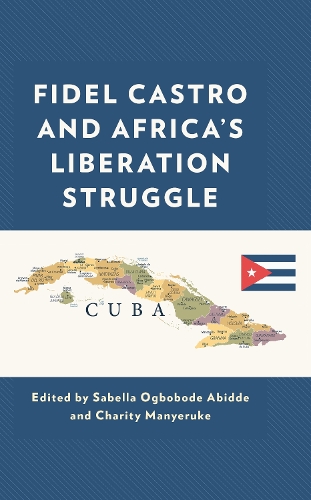
Fidel Castro and Africas Liberation Struggle
(Hardback)
Publishing Details
Fidel Castro and Africas Liberation Struggle
By (Author) Sabella Ogbobode Abidde
Edited by Charity Manyeruke
Contributions by Michael R. Hall
Contributions by Stephen Chan
Contributions by Priye S. Torulagha
Contributions by Felix Kumah-Abiwu
Contributions by James Korku Agbodzakey
Contributions by Olusoji Alani Odeyemi
Contributions by Elisha J. Dung
Contributions by Musafare Mupanduki
Bloomsbury Publishing PLC
Lexington Books
1st October 2020
United States
Classifications
Professional and Scholarly
Non Fiction
History of the Americas
972.91064092
Physical Properties
Hardback
228
Width 162mm, Height 243mm, Spine 20mm
485g
Description
The post-1959 Cuban governments engagement with Africa, which was led by its charismatic and revolutionary leader, Fidel Castro, had two connecting dimensions: military internationalism and humanitarian internationalism. While African states and societies benefited immensely from these engagements, it was Fidel Castros military assistance towards the decolonization of and the pushback of Apartheid South Africa that received the loudest attention and ovation in the developing world. Fidel Castro, this book argues, was never motivated by economic, selfish, or geopolitical considerations; but rather, by the altruism and the certainty of his worldview and by the historical connection between the peoples of Cuba and Africa. The principle of international solidary, socialism, and the emancipation of Africa was a much-desired aspiration and attainment. Beginning covertly in Algeria in 1961 and the Congo and Guinea-Bissau in 1964; and more conspicuously in Angola in 1975, Fidel Castro and his socialist government was at the forefront supporting liberation movements in their struggle against colonialism. Defining Castros engagement with Africa was his support for the Peoples Movement for the Liberation of Angola (MPLA) against the United States-backed Apartheid South Africa, which supported the National Liberation Front of Angola (FNLA) and the National Union for the Total Independence of Angola (UNITA).
Reviews
Heroes and legends such as Fidel Castro are often larger than life and difficult to contain in one volume. Yet, this volume succeeds in providing broad strokes of Castro and Cuba's solidarity with Africa. Contributors to this volume provide detailed and informative descriptions of how Castro and Cuba interacted with Africa on the basis of respect and equality. I warmly recommend this outstanding book to readers from diverse disciplines.--Ezra Chitando, University of Zimbabwe and World Council of Churches, Ecumenical HIV and AIDS Initiatives and Advocacy
This is a must read for anyone interested in history and rise of liberated Africa. Finally, an objective and historical assessment of Fidel Castro's contribution to and influence on development and political ideologies beyond Cuba.--Brenda I. Gill
Author Bio
Sabella Ogbobode Abidde is professor of political science at Alabama State University.
Charity Manyeruke is the ambassador of Zimbabwe to Rwanda and professor in political science and international relations at the University of Zimbabwe.
